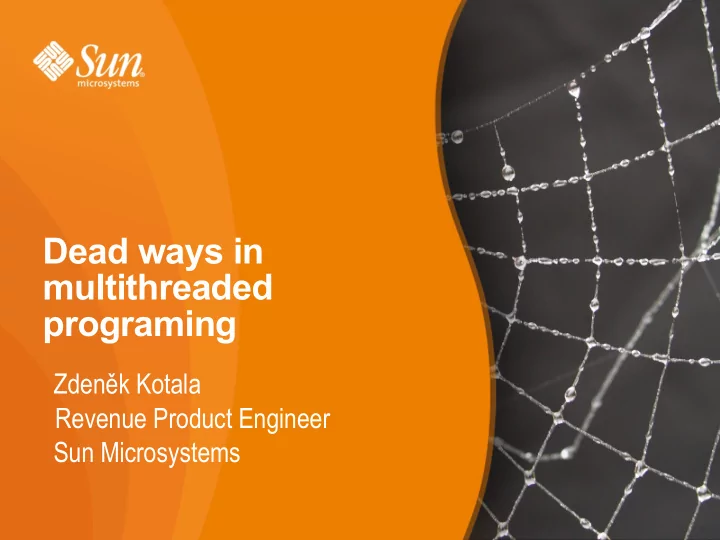

Dead ways in multithreaded programing Zdeněk Kotala Revenue Product Engineer Sun Microsystems 1
Agenda • Process life • Signals • Atfork handlers • Memory access • Sessions 2
Why • Nine years ago I spent one month to develop multithreaded application and three months to hunt a bugs. • In former company I spent 3 weeks to rewrote signal handling to work correctly. • Now because 6842872, 6828366, 6823591, 6548350, 6276483, ... 3
Process life - I • Before main() function compiler and linker add prologue which setup libraries. • After main() compiler and linker add epilogue which call exit(2) from libc. • Exit(2) function call all atexit handler and close all opened files. After that it calls _exit(2) syscall. • _exit(2) syscall start to cleanup process and their threads. 4
Process life - II • Prologue runs as single threaded and .init sections are processed in the main thread, but if library is dynamically opened by dlopen(3C), application can have more threads already. • When exit(2) is invoked other threads are still active and running. Clean up (e.g. atexit handlers, .fini) usually causes fatal errors or crash. 5
Process life - III • Do not except that .init section runs in single threaded process. • Do not call exit(2) function when more threads are running. • Dedicate one thread (usually main thread) which control worker threads and which is responsible for cleanup. 6
Signals - I • Signal is asynchronous event used for inter process communication. • When signal arrives and it is not blocked one thread is interrupted and the thread runs signal handler. • Signal handler runs in parallel with other threads. • Each thread has own signal mask which is inherited from parent thread. • Because list of signal safe functions is limited dedicate one thread to signal processing is better. • DO NOT use mutexes in signal handler. 7
Signals - II void *sigint(void *arg) { int sig; for(;;) { sigwait ( &signalSet, &sig ); if ( sig == SIGINT ) { printf("Got signal SIGINT\n"); return NULL; } } } 8
Atfork handlers I • Fork(2) calls create children process which inherits only calling thread, but all mutexes, condvariables and so on stay in state before fork(2). For example some mutexes can be locked. • It is important (especially for library) to handle it correctly. • pthread_atfork(3C) allows to setup handlers which are called before and after fork. Handlers should acquire all mutexes before fork and released it after. • Atfork handlers are processed in parallel with other threads. 9
Atfork handlers II • Atfork handler have to be setup before any lock is acquired. • Order of handlers registration is important. Wrong order can lead to deadlocks. • Fork(2) and pthread_atfork(3C) use internally same mutex for atfork handler list access. 10
Atfork handler III App 1 App 2 App 3 libpkcs11.so Meta sl. Slot 1 Slot 2 dlopen()/dlclose() pkcs11_softtoken.so pkcs11_kernel.so Note: Linking application directly against to pkcs11_softtoken and pkcs11_kernel is not recommended. 11
Atfork handler IV Thread 1 Thread 2 C_Initialize(...) pthread_mutex_lock(&global) ... … fork() pkcs11_slot_mapping(...) pthread_mutex_lock(&atfork_list) dlopen(softtoken) pkcs11_atfork_prepare() .init pthread_mutex_lock(&global) pthread_atfork(...) pthread_mutex_lock(&atfork_list) 12
Parallel memory access • Access to shared memory has to be protected by lock. It is not necessary only in few cases. • Locking is expensive and also critical section length has impact on performance and scalability. • Using one giant lock is easy to implement, but application scalability is poor. • Locking has to be designed at begging of development. Any future lock splitting is expensive and it is root cause of many bugs. • Prefer pthread_rwlock for better scalability. 13
atomic.h • Solaris offer bunch of atomic operations in atomic.h (atomic_ops(3C), membar_ops(3C)) • It is good when we need simple data structure modifications. • Unfortunately, functions are not portable. • Membar_ops are generic memory barriers which are dedicated to guaranties read/write memory order. 14
Thread Local Storage (TLS) • Thread local storage is method how to store thread specific data. • POSIX defines pthread_key_defines, pthread_setspecific, pthread_getspecific function. • Compilers offer syntactic sugar. For example: __thread int localint; 15
Sessions • Sessions are used to keep state information of communication between client and server or application and libraries. • One session should not be used in different threads. Parallel usage causes usually crash or strange behavior. • Session pooling is used for resource reduction in some cases, but usually it has limitations. 16
Thanks to Julius Štroffek Chris Beal guug 17
Dead ways in multithreaded programing Zdeněk Kotala zdenek.kotala@sun.com 18
Recommend
More recommend